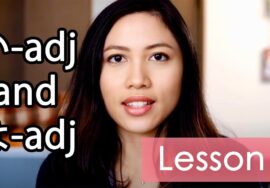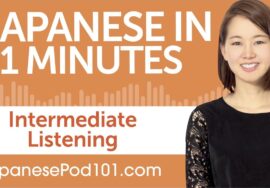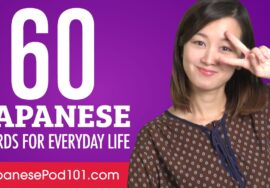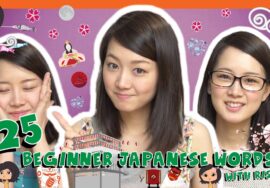Japanese Conversation: Learn while you Sleep with 2000 words
← Click here and get the best resources to learn in the most efficient way.
↓ More details below ↓
Step 1: Go to
Step 2: Sign up for a Free Lifetime Account – No money, No credit card required
Step 3: Start learning Japanese the fast, fun and easy way!
This video is for you because we will help you improving your Japanese vocabulary!
You've decided to start learning Japanese, so let's get you speaking like a Japanese native speaker! In this video, you'll learn the most important survival phrases in Japanese, all the phrases you need to know before you travel. If you want to start learning Japanese, this video is made for you. You will learn 2000 words while you sleep.
This is the fastest, easiest way to pick up basic Japanese!
Click here to get started with the Japanese language:
Also, please LIKE, SHARE and COMMENT on our videos! We really appreciate it. Thanks!
#Japanese #LearnJapanese #JapanesePod101 #Conversations #NativeSpeaker











I had a dream that my best friend turned into Usagi from Sailor Moon and kept repeating seatbelt in Japanese
Bro its a sign
You mean seatobelito
Too bad it wasn’t Usagi Yojimbo
?
WTFFFFFF
Me trying to sleep: ?
My sleep demon: konnichiwa
Bro ???
@Zachary_JT I want to learn Japanese so I can say bad words to my stupid annoying classmates that bully my best friend, AND the teacher won’t understand anything. ?
Haha this is funny af
Lmao
Yametekudastop
I don’t actually believe I will learn while asleep, I just watch these to listen while I’m falling asleep
@Aeolian ?️ and how do you read while falling asleep is beyond me…
This is great for learning familiarity with sounds and proper pronunciation. Daily immersion is key, imo.
soudesune ?
@Aeolian ?️ okay but learning japanese with japanese sub would be hard af. especially if you wanna learn real sentences and speak your own sentences, you can’t really tell which word is which. たとえば、このように空間が見えにくい. yes, you can see the words but you cannot identity which word is which if you’re only learning from a sub
@elwoodzmake
What are you talking about? I never suggested reading while falling asleep. Learning ANYTHING while falling asleep is bullshit.
Besides that, show me studies that show that comprehensible input doesn’t work.
Me: sleeps with this
Also me: *sleep paralysis*
My demon: Ohayo, Oni-san!
morning already? noo fove more minutesss
oni-san…? monster san??
@grace lol.???
demon its to late for it to be morning
Fck??
I work up and started speaking Japanese fluently. But then I realised, I was Japanese.
This does not help me at all
here to offer a bit of advice as someone who’s been studying japanese and making significant progress: please don’t use this 🙂 especially as a beginner. the selection of vocabulary words are wayy too random and it’ll be diffucult to retain. i recommend that after learning hiragana and katakana, start learning your kanji and get yourself a good grammar book (you can get them for free online as a pdf ?)
a good beginner’s grammar book will teach you not only grammar but beginner vocabulary in context. a personal piece of advice is to start a journal in japanese and write about your day/week bc it helps you figure out the grammar and vocabulary you need to talk about yourself and your hobbies. i did this for korean and it worked wonders !!
if anyone needs any recommendations, i have a ton for websites, books and youtube channels 🙂
@azure tae kim has a great grammar guide online !! for youtube i like Japanese Ammo with Misa and Miku Real Japanese 🙂
How can I learn kanji? Should I learn kanji seperatly (like using Kanji study/kanji garden and rawly memorize) or should I learn from context? Please answer me.
@natalia Haha, I have Genki as the book ? failed a Japanese class cuz of my anxiety ?
@natalia if you use Genki check out Tokini Andy’s channel. He’s covered the two Genkis and is currently on Quartet.
Sound advice op
I’ve always noticed that when you’re trying to start out with hiragana & katakana nobody really tells you which you should start with, I decided to start with hiragana since it came long before katakana and that katakana is only about translating newer foreign words
I’m pretty sure people always say hiragana, then katakana
Hiragana > Katakana > Kanji. I’m studying kanji rn and practicing my katakana still. 🙂
I started with katakana
In my japanese school we start learning hiragana and then katakana and in the end kanjii
What are you talking about, almost all tutorials say one should start with Hiragana
this is too long honestly but I’ll keep playing this while going to sleep and repeat it for a month so i can memorize it even better
1 year has passed, I need an update. Does it work?
@hazado no going to sleep and learn vocabulary is a really dumb idea. You have to write them down and repeat them in order to remember them
@hazado no it doesnt actually work
@hazado probably not
Did it work after a month
all of these comments are all about anime i just wanna learn japanese because i love their culture.
edit: I NEVER SAID I DIDNT LIKE ANIME!!!
Same, most people wanna learn Japanese for anime I wanna learn Japanese because I love the culture and I wanna visit AND I wanna talk about my friends badly without them knowing. (The last reason was a joke the rest was true.)
I just wanna learn Japanese so i have a skill in the future that could (potentially) help me along with other languages like French and Chinese
@Ferado Juega it’s really not. Anime just takes from Japanese culture. That’s like saying American cartoons are apart of American culture… it’s just cartoons that are created for one’s culture and relations. Cartoons can cater to any culture.
@Ferado Juega I hate weebs
Anime is part of Japanese culture so…
As you’re falling asleep (when you’re still awake) you can learn things from this, but while you’re actually asleep, you learn nothing
@everyone Actually when you sleep the neurons get smaller so that a cleansing liquid can go between them and take all the waste ( chemicals ) that the neurons use to speak to eachother.
And learning is the practice of a neuron establishing contact with other in a way that creates a path of neurons ( idea ) and then repeating it untill those connections get stronger and long lasting.
I dont know if and how much you can learn while sleeping; but i know that if you do not sleep propperly then it will become a lot harder for you to learn anything the next day as your brain will still be stressed from the day before.
IKR i didnt learn anything while i was asleep but when i was AWAKE mm… BEAUTIFUL
You would be better off just listening to a Japanese podcast or something while sleeping because even passive listening helps increase comprehension. I don’t recommend anyone listening while sleeping in the first place because its effectiveness is questionable and hinders your sleep, but if you really want to, videos like this isn’t the way to go.
@Villanvitella YT if your brain would completely shut down, we would “die”.
If our brain shut down, the blood that’s in the brain will stop flowing and you’d be clinically dead.
So the person who is “dumb” and gets F’s in class is you.
It takes 2 second to search that, but instead you spent those 2 seconds writing that
@Villanvitella YT You’re
Very soothing, Didnt really help sleep at all but I did learn a few words from it
I love how “dull” turns into SO MANY WORDS like wtf
I love english is doorknob while in japanese is nobu like wtf??♂️
How can I be asleep a minute in?
@Martin Townsend this is ridiculously funny to me
You’re supposed to be asleep bro
Hamna
Man this can really complicate the fact that I am hardcore learning Japanese 12 hours a day slicing through kanji like nothing and progressively able to read kana words faster
@AmazaToad honestly immersion in my experience isn’t that useful when i first started out in Spanish because your not focused on the actual language its just mainly focusing on the subtitles if you really wanna learn through immersion lisaning without the subtitles and try to pick up patterns in the why they speak so that your mind will overtime when you improve recall the patterns you recognized and it will click a little bit easier. sorry for the spelling mistakes
@Nadine thanks best of luck to you. And remember to stay consistent and in practice range. That’s the only way japanese will enter your long term memory
@AmazaToad oh thank you. You helped me alot. I have start for a few weeks. I can only hiragana and katakana and a few words. But I think I should also buy this book.
Good luck by learning!?
@Nadine oh I have only started a week and a half ago. I learned hiragana and katakana in this channel and I just watched the kanji series to know the basics. Then after that I proceeded with buying an N5 book (The yellow one with the wolf ? looking animal on the bottom (it’s popular) and I have been studying 2 sections per day. Everyday. Ofcourse practicing everything that has yet to go to my long term memory over and over again. After learning and practicing. I do some Immersion. Literally anything works but make sure you have English subtitles so that if there’s any word you know you can always replay and focus on hearing it. It helped me so much especially when hearing a statement multiple times and when reading the captions it’s always something similar to one another. You can watch japanese podcasts/game shows/movies/anime for Immersion they work great. Personally I choose to watch anime. Both fun and the words are rather clear to hear. You can use lingo deer if you want. Slightly better than Duolingo but more pricy. When kanji come up in my N5 book I look them up in the kanji Study app and for more grammar information I highly recommend download Tae Kim’s guide app. It also teaches some informal ways to say think that no book will teach you. And I highly recommend having two notebooks. One only for vocabs and kanji and one for sentences you see in your N5 book if you do choose to up buy one. I personally write the vocab on the left side of the notebook and the kanji on the right side of the notebook. If you need anything cleared out tell me. And as always. Know that as a beginner you’re pretty much a baby with no knowledge. Don’t think about it as being older so you shouldd know. There’s no ‘should’ in learning a language. Think about it as a baby listening and trying to imitate sounds/words/sentences. As time moves on you’ll know how to write/read/speak
@AmazaToad omg thank you so much for these tips as I am currently taking japanese courses ??
Finally, something that accompanies my sleep style!
This really works. I learned a lot of Japanese words while sleeping.
There’s just one problem though, I forgot all of them when I wake up.
I remember some words but I lucid dreamed that time here some words I remembered
ごめなさい-im sorry
おはよございます-good morning- which I always use when I wake up
すみません-im sorry/ excuse me
ばか-idiot-they didn’t teached this but I somehow learned it myself
わたしわすしがすきです-i like sushi
?
lol
EreH once said by mikasa maybe more than once
????
I actually listen to this while I study, it’s really relaxing and actually helps you focus
As a native speaker, I have to say that this video has critical defect of lack of Japanese particles (助詞/じょし/joshi). In Japanese language, words are distinguished not only by the pitch of the word itself, but also by the pitch of the particle that follows it.
For example, a word presented as “はし/hashi” might mean three different words: “箸 (chopstick)”, “橋 (bridge)” and “端 (edge)”. Without particles, while “箸” is distinguished from the others by the pitch of ” *ha* shi”, “橋” and “端” have the same pitch, “ha *shi* “. The subject particle, for instance, “が/ga” distinguishes these two words and they are pronounced as “橋が/ha *shi* ga” and “端が/ha *shi ga* ” respectively.
@azukazu you are are welcome ??
@azukazu Ou i
@Ella? Ou
@Ella? ioi
Super helpful, thanks! ?
Great job guys! We now have 48,000 more words to go!
Wait what.
??
@Crawford Yeah but you know, there’s always space for improvement, I’ve bee learning English since I was 6 (now I’m 15) and When I see a word I don’t understand i don’t sit with my arms crossed, I search what does it mean and I try to implement it in my vocabulary within the next week, you’re never really done learning a language tbh
there’s not a single japanese person that knows all 50,000 kanji! it’s like english words, i bet you’ve never met a person that knows all english words! /lh
Yyyeeeessssss!!!
Bro I don’t know 2000 words in my native language but u want me to learn Japanese in 4 hours while being unconscious ?
@Arctrog it is a joke.. ?
I am not sure if this is a joke but a kindergartner knows 2k words, basic fluency in English requires 30k words. A mid schooler usually knows 50k + at the low end. To speak n2 in Japanese you need over 5k and that doesn’t include the grammar structures which are separate words in English, and for n1 which is native fluency you need over 10k
Edit: for the big numbers I am talking about receptive vocabulary, not spoken, but even spoken the average for an adult is well over 20k
lol